There are 329 respondents. That’s probably around 10% of regular readers.
Most are male:
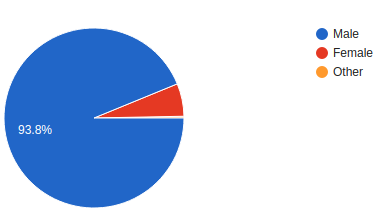
Diverse ways people found this website:
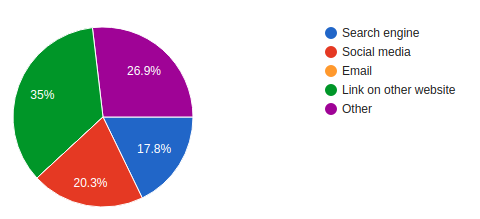
Most people speak English, then Hindi and Tamil (the 8%). Also, looks like about half of the Hindu readers are Brahmin:
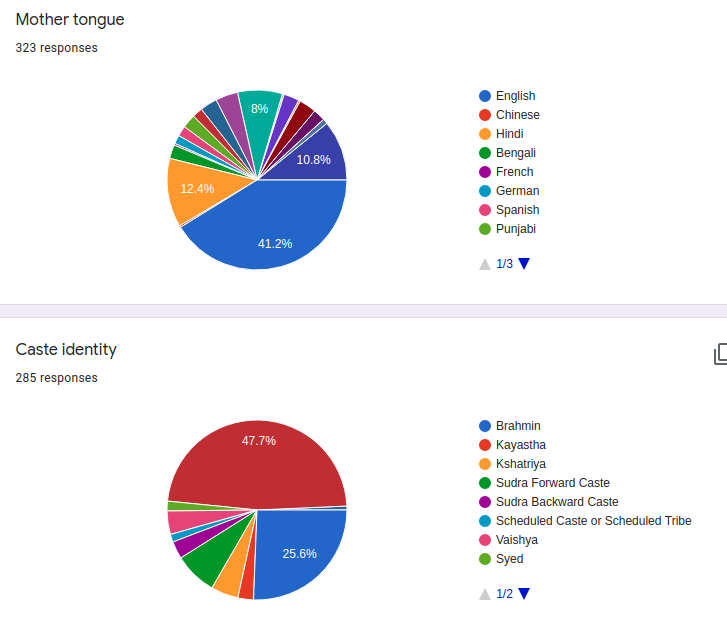
In regards to Hindu nationalism lots of opinion. Plurality is mixed opinion of Hindu nationalism:
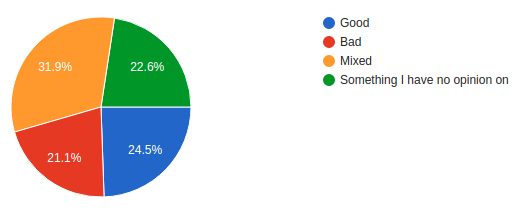
A moderate bias to the Right:
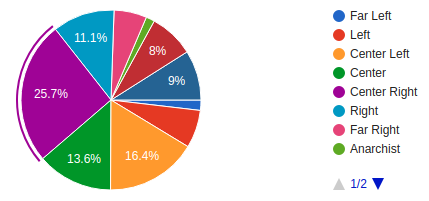
A secular readership. 25% conventional theists. 37% atheists:
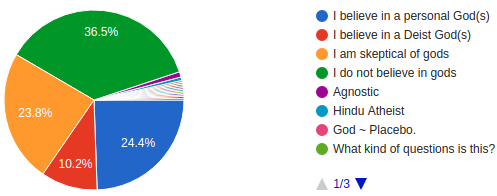
Plural majority of Hindus. Then no religion:
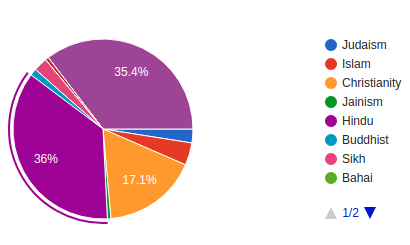
Generally educated:
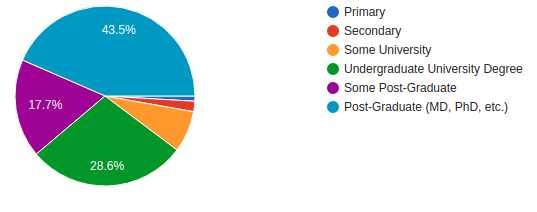
![]()
The majority of readers are subcontinental. But almost 40% are white.
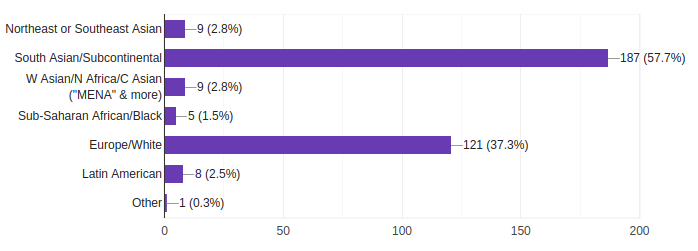
White folks mostly never comment, i wonder what types of topics interest them here. Because most of the non genetic posts are related to the subcontinent one way or the other.
I’m a white commenter. I’m generally interested in South Asia and especially India. Hinduism is fascinating to me because it is one of the last major religions left which isn’t Abrahamic (shintoism and ‘ancestry worship’ is widespread in East Asia but doesn’t have the same civilisational verve and pulse). I’m not a Christian, and in fact I view Christianity’s takeover of Europe as a massive loss for us. So, understanding how Hinduism survived the Abrahamic onslaught but native European faiths did not is of central import to me.
More generally, Razib’s posts about genetics are interesting. His political outlook (center-right on social issues and center-left on economics) is quite rare in the West, not among the population perhaps, but certainly among people in elite institutions. That gives his posts a rare vantage point that you seldom come across in the mainstream press. Lastly, he does write quite a bit about European history and draw parallells to it even when discussing India. So that forces me to think about my own history in different ways even as I learn about South Asia/India.
No need to answer but I just wander about which kind of non-Christian European and which kind of history is of interest. It seems not Serbs friendly (no dramas) but at least you will not feel lonely here even without a key joker. Again, can ignore this comment/question.
Serbs are cool people. Aunty’s husband is a Serb. Genuinely nice person (I didn’t realise there were so many mountains in Serbia). Don’t get many of them in Western Europe though, surprisingly.
Cold too. When he recited the genocide during the Balkans show of the 90s, he just smiled and said the Muslims were punished for being “naughty”.
Never understood how a proud people let Yugoslavia go to such a mess when, as far as I know, the Slovenians and Croats were still willing to stay up until the late 80s. Never understood how the Serbs of B&H don’t join with Serbia too. Decent chunk of land.
Yep, we are very cool and sometime we like a black humour (brown, too). There is very hilly but there is very fertile flat land, too. You cousin is probably from Bosnia, that is mostly mountain region. There was no genocide in Bosnia, it was a propaganda and insult for real genocides against Jews, Armenians and Serbs. How to call killing of almost 4 million Vietnamese?
In one sentence – Slovenian and Croats had privileged position in Yugoslavia because of their communist leadership and treated the rest of Yugoslavia as a colony. When time came to be equal with others they did not want to be there anymore but they wanted to take some Serbs and their land with them. Muslims almost got civilised as the rest of Europe, but it came radical islam and they wanted a Caliphate from Bosnia to Indonesia. This thing is still not finished, 3000 terrorists sent by Pakistan government and thousands of other sleepers are in Bosnia and waiting for a sign to move on.
Btw, do you know the origin of your, I guess, Sikh surname (and the meaning of the term ‘Sikh’, too)? The old name of Belgrade was – Singidunum. You may find that you are much closer to your cousin then you think. Maybe his ancestors went out of India to Balkan long time ago 🙂 ?
Another white here, from South Africa – I’ve been reading Razib on and off for years.
I concur with principia above. I read the genetics posts because they are facinating – although often a bit over my head.
But I also read him specifically because of his unorthodox political views – mentioned above as well. He bats for no team and has his facts straight; so when he challenges my more typical left-liberal leanings I know it’s worthwhile to sit up and listen.
The discussions on the Asian life in America and the subcontinent are just interesteing in themselves, as windows into a human experience different from mine. South Africa has a substantial Indian community that keep much to themselves, I sometimes wonder which of the discussions here would reflect some of my Indian collegues’ experiences as well.
“South Africa has a substantial Indian community that keep much to themselves”
Mr Gupta would surely disagree 😛
https://www.vanityfair.com/news/2019/03/how-the-gupta-brothers-hijacked-south-africa-corruption-bribes
The Gupta family that’s been orchestrating state capture in South Africa are not from the local South African Indian community. They only moved to South Africa in 1993.
Susara Blommetjie,
It would be great to do a podcast on South Africa.
Indians represent 2.4% of the population. Chinese 0.3% of the population.
Chinese are by far the most per capita socio-economically successful. Indians are the second most per capita socio-economically successful.
About 80% of South Africa’s population is black. Yet there are about 1 1/2 times as many Indian millionaires as black millionaires.
What accounts for the amazing socio-economic success of South African Indians? And of the expat Indian diaspora (and Chinese diaspora) around the world more generally?
Any speculation I would have on the reasons for the relative success of the Indian community in South Africa would be based on very limited personal knowledge and experience, so it’s very tentative.
The South African Indian community was established in the 19th century, when the British brought over indentured servants to work on sugar plantatations. The Brits also brought highly educated Indians to their African colonies to work as administrators, but the percentage compared to the manual labourers would have been small. So why their (relative) success given there was no selection for a particularly well-educated population?
I’ve got a guess. Apartheid severly limited the means with which Indians could earn a living. They could not own land or any fixed property – not even in a fake homeland. They were not even allowed to stay overnight in one of the four provinces of the country. I suspect white land owners preferred Black labour to Indian (for all kinds of reasons).
So what might have happened is, given the limitations on other ways of earning income, the community decending from the of indentured labourers capitalised on their cultural tradition of entrepreneurship; they went into small businesses; material, clothing, small general stores. They were willing to serve the black community which, although poor, was large. Those decending from the more educated immigrants really pushed education to as high a level as the apartheid system would allow them; especially science, engineering and medicine.
My husband works for a large clothes retailer, and I work in telco. Both of us have noted the disproportionate percentage of Indians working in clothes retail and IT respectively.
If my theory holds any water, it seems like many factors correspond to those often given for the relative success of the Jews in European communities.
Susara Blommetjie here is a more sensitive question. In 1980 the distribution of caucasian South African socio-economic outcomes was higher (inclusive of the mean and median) of Indian South African socio-economic outcomes.
In 2020 it is the opposite.
How did this happen over 40 years?
Is this fact widely known by caucasian South Africans? What do they feel about it?
What do South African blacks think about it?
What do Africans across the continent think about the relative success of their tiny Indian expatriate diaspora minority?
Even more successful than Indians in South African and many African countries is the ethnic Chinese minority. What explains this success? Is there a fear that China is taking over the African continent? Do Africans want to befriend, India, Japan, South Korea other Asian powers to protect themselves from China? Do Africans want to befriend Brazil, Europe, Canada and the USA to protect themselves from China?
++++++++++++++++++++++++++++++++++++++++++++++++
Final question. I use to closely follow South African 1990 through the early 2000s, reading many of your newspapers and magazines. The South African economy since 1991 (when the current global boom began) has grown far slower in real terms than I had expected. Why is this? Is there way to increase South African total factor productivity?
Hm. Books have probably been written on each of your questions. Take my short comments from the white, middle class Afrikaner old enough to remember whites only parks and pass laws from whom it comes.
Difference in distrubution of white vs Indian socio economic incomes between 1980 and 2020? I didn’t know that, and I doubt many whites do. What blacks think of it I would really not know. To explain? Perhaps white emmigration, which lowered average white income levels. And with apartheid gone Indians could actually really thrive, leveraging the business skills they’ve had to hone just to make a decent living the olden days? Very speculative.
As for the success of the Indian diaspora in the rest of Africa – the story of the Indian communities in the rest of Africa is so different from that of South Africa I would just guess. But didn’t Uganda expell their entire Indian community after independence? I wouldn’t be surprised if there was a lot of distrust, especially since Indians were possibly seen as lackeys of the British overlords.
There is indeed a lot of talk about a ‘second colonisation’ by Chinese of Africa. But I think that’s more in reaction to Chinese government envolvement on the continent, rather than resentment of the success of individual Chinese business people.
Your last question I answer with confidence in my personal opinion: Jacob Zuma and state capture. The term is not an exaggeration.
Susara Blommetjie,
Thanks for your informative comments.
I think the woke SJW post modern cultural marxist, critical race theory, subaltern, intersectionality, third wave femnism LBGTQ frame . . . is a major negative technological shock to the global economic system which significantly lowers global total factor productivity.
Our species needs the black (sub-saharan African black) savior. We also need more than one large pockets of black exceptionalism (excellence, capacity, competence, merit). These can be on the African continent, or among the black diaspora around the world. Their geographic locations do not matter much.
How to achieve this?